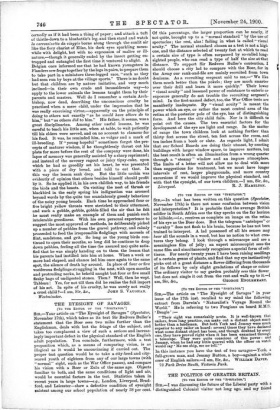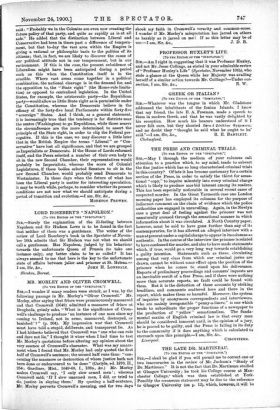THE POLITICS OF GREATER BRITAIN.
[TO THE EDITOR OF THE "SPECTATOR.")
SIR,—I was discussing the future of the Liberal party with a distinguished Colonial visitor not long ago, and my friend
said: "Probably we in the Colonies are even now creating the future policy of that party, and quite as rapidly as is at all safe." He added that the distinction between Liberal and Conservative had been in times past a difference of tempera- ment, but that to-day the vast area within the Empire is giving a, rational or philosophic basis to the politics of its citizens; that, in fact, we are likely to discover the cause of our political attitude not in our temperament, but in our environment. If this is the case, the present subsidence of Liberalism might have been anticipated during a period such as this when the Constitution itself is in the crucible. Where vast areas come together in a political combination, the national cleavage is in the demand for, and the opposition to, the "State right" (the Home-rule limita- tion) as opposed to centralised legislation. In the United States, for example, the aristocratic party—the Republican party—would allow as little State right as is permissible under the Constitution, whereas the Democrats believe in the efficacy of the forty-five local Parliaments within forty-five "sovereign" States. And I think, as a general statement, it is increasingly true that the tendency is for districts near the centre (Washington) to go Republican, while those nearer the circumference are the more determined to assert the principle of the State right, in order to clip the Federal pre- rogative. If this is the case, we may discover a little later that in the British Empire the terms " Liberal " or "Con- servative" have lost all significance, and that we are grouped as Imperialists or Democrats. If the House of Lords reformed itself, and the Peers selected a number of their own body to sit in the new Second Chamber, their representatives would probably be Imperialists, whereas the score of Colonial Legislatures, if these bodies selected Senators to sit in the new Second Chamber, would probably send Democrats to Westminster. In these days when the future of what has been the Liberal party is matter for interesting speculation, it may be worth while, perhaps, to consider whether its present conditions are not now what we should anticipate during a period of transition and evolution.—I am, Sir, &c.,
MORETON FREWEN.











































 Previous page
Previous page